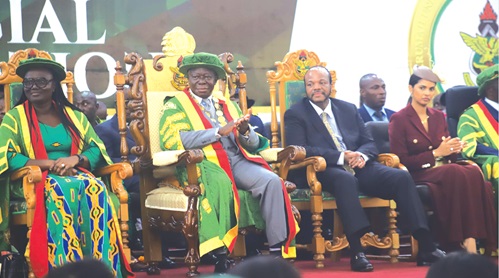
The Vice President, Professor Jane Naana Opoku-Agyemang, has said government will not interfere with the governance and operations of public universities in order to enhance academic freedom on campuses.
This is meant to ensure the smooth functioning of governing councils and managements of public universities across the country.
She made the disclosure on Saturday, June 28, 2025, at the 58th special congregation of the Kwame Nkrumah University of Science and Technology (KNUST) where the Chancellor, Otumfuo Osei Tutu II, the King of Eswatini, Mswati III, and his wife, Nontsetselelo Magongo, as well as the Minister of Local Government, Chieftaincy and Religious Affairs, Ahmed Ibrahim, were all present.
She noted that government places high premium on academic freedom, the reason it is empowering the various university councils and managements to perform their statutory duties without any political interference.
“The Ministry of Education, through the Ghana Tertiary Education Commission, will continue to partner with institutions to ensure that they continue to comply with the regulations, policies and standards, and that governing councils operate within the provisions of the Statutes and Acts that govern university operations,” she stated.
According to the Vice President, the sector ministry will only come in to ensure compliance but not to interfere unduly with processes guiding the administration of these institutions, stressing that “government’s non-interference policy means that universities will continue to be held to high standards.”
The assurance comes in the wake of previous attempts by the former government to introduce the Public Universities Bill in the two previous Parliaments in 2019 and 2024, which were met with uproar by the public universities over its supposedly unfavourable content.
The Bill sought to give the government the power to appoint the majority of members of the public university councils.
It also sought to provide the procedure for the establishment of public universities, set out principles for the management of public universities, determine the procedure for financing public universities and administration, among others.
That enterprise was viewed as a deliberate effort by the then government to control public universities.
Education Minister unveils GH¢40 million seed fund for emerging public universities












